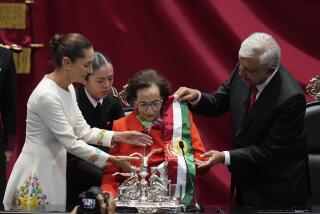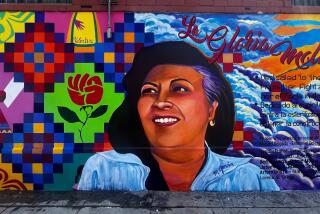Argentines Still Cry for Evita, Defend...
- Share via
CIUDAD EVITA, Argentina — On most days, the bronze bust of Eva Peron seems forgotten, kept company only by the weeds sprouting below.
Now and then--on her birthday, Peronist Day and the anniversary of her death--devotees brighten the roadside monument with roses and wreaths.
The legacy of Eva Peron and her husband, the late President Juan Peron, faded as time passed. And in recent years, President Carlos Menem, head of the Peronist Party, reversed the old nationalist policies in the name of a “new” Peronism.
Then Oliver Stone came to town to shoot the movie version of Andrew Lloyd Webber’s hit musical “Evita,” which depicts its heroine as a power-hungry woman who slept around, and all that began to change.
Even 42 years after she died of cancer at age 33, such an image of Eva Peron is heresy to many Argentines, particularly the “shirtless ones” who venerated her in life.
“People see her as an idol, a respected figure,” said Horacio Raffo, a popcorn vendor in Ciudad Evita, a working-class area 15 miles west of Buenos Aires named for her. “If they make a film that says she’s a prostitute, well, people here can’t take that.”
Over a convivial lunch, Menem originally told Stone he would have access to government buildings, including the presidential offices. After a week of complaints, he decided the story “distorts historical truth.” The government now says the American director can make the film in Argentina, but not inside any government buildings.
“It would be like letting Oliver Stone use the White House to say Kennedy was a homosexual,” said Patricia Bullrich, a Peronist congresswoman. “What we’re saying is, if you’re going to insult my mother, do it in the street, not in my house.”
The real Evita was born in Buenos Aires province, moved to the capital at age 15 and became a radio, stage and film actress.
She was about 25 when she met Peron, an ambitious army officer twice her age. They were married a year later, in 1945, and a year after that he was elected president, making his wife the most powerful woman in Argentina.
She became the champion of workers and the poor. Her Eva Peron Foundation built schools and hospitals and bought gifts for needy children.
“A man who is 55 years old today might remember the foundation giving him a soccer ball or a trip to the beach when he was a child,” said Felix Luna, a leading historian. “So now he romanticizes Evita and that whole period.”
She was adored by the “resentidos,” the have-nots who hate the rich. “Shall we burn down the Barrio Norte?” she would ask them at rallies, referring to a wealthy section of Buenos Aires.
In her autobiography, “The Reason for My Life,” which was required reading in primary schools, she wrote: “When I discovered that there were poor people and rich people in the world, the strange thing is that the existence of the poor didn’t cause me as much pain as the knowledge that, at the same time, there were people who were rich.”
Understandably, rich Argentines despised Evita, calling her a phony populist.
“She always provoked heated political debate,” said Congressman Jorge Matzkin, leader of the Peronist bloc in the Chamber of Deputies. “After 42 years, the intensity of emotion has lessened, but it’s still there.”
Matzkin helps keep it alive by hanging a portrait of Evita on the wall outside his office. In a recent protest march, metal workers wore plastic headbands inscribed with “Evita Immortal” and drawings of her and Juan Peron.
Tourists visit Evita’s mausoleum at Recoleta, the cemetery of the powerful. Her body has been carefully preserved, but only family members are permitted to view it.
Luna, the historian, said Evita “belongs to Argentine mythology” along with the late tango singer Carlos Gardel and, “30 or 40 years from now,” soccer star Diego Maradona.
“When someone becomes a myth,” he said, “real history isn’t relevant.”
More to Read
Sign up for Essential California
The most important California stories and recommendations in your inbox every morning.
You may occasionally receive promotional content from the Los Angeles Times.










